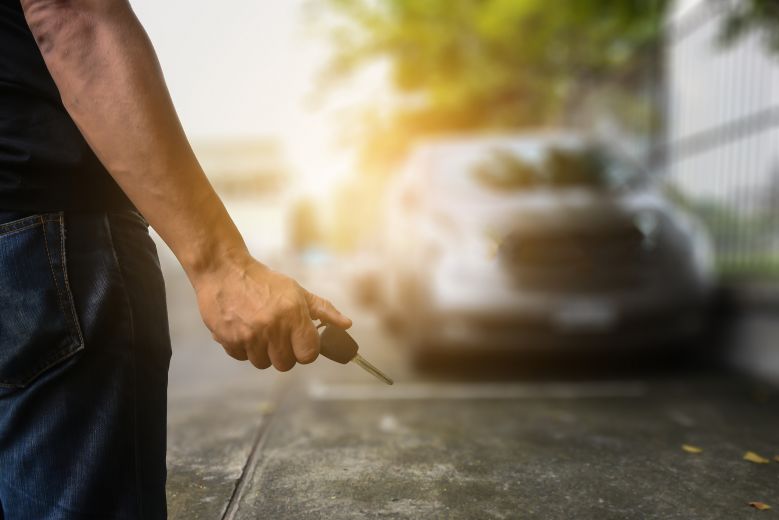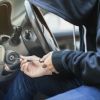We look at how thieves are now targeting new vehicle technology to gain access to vehicles, and what you can do to deny them.
Guide contents
- What is car key hacking?
- How does car key hacking work?
- How can you avoid thieves hijacking your key fob signal?
- What is a car key fob blocker?
- Does tin foil protect keys from relay box hackers?
- How else do thieves target keys?
- What other methods of stealing key fob signals are used?
- What else can be done to protect against car thieves?
- What are car makers doing to help improve vehicle cyber security?
- Why poor vehicle security matters to everyone
What is car key hacking?
Key hacking is when thieves attack built-in systems that can unlock a car when the key is nearby, without having to press a button on the fob or put a key in the lock.
If close to the car, the key sends a short-range signal that tells it to unlock, even if it’s in your handbag or pocket.
But car thieves have devised ways to scan for and hack the signal to give them access to some cars.
- High tech methods see car thefts up by over half
- Replacing lost car keys costs motorists over £180m
- More than 100,000 vehicles were stolen last year – as thieves target cars with keyless technology
How does car key hacking work?
Key hacking is also known as relay theft. Thieves use electronic car key relay boxes, putting one near your home to receive signals coming from your car key fob through the walls or windows.
This first box then boosts the signal to a second device near the car, to trick it into registering the key as nearby and unlocking the doors.
How can you prevent thieves hijacking your key fob signal?
You can use a two-pronged approach to prevent your car being stolen:
- Take preventative measures (see key fob blockers below) to stop someone from stealing your key fob signal
- Make sure all software has been updated on your vehicle
- Use steering locks and other preventative measures that will put thieves off attempting to drive off with your car
RAC Insurance director Mark Godfrey says: “Drivers with keyless systems can take precautions to prevent their vehicles being stolen including storing their keys in protective cases so the signal can’t be cloned, or even switching off the keyless feature on the fob if it is an option.
“And try to avoid storing your keys by the front door – it may not be fail-safe but get into the habit of leaving your keys well away from your vehicle, such as at the back of the house.”
5 Star Defaqto rated cover
RAC Comprehensive Car Insurance Plus has been given a 5 Star Rating by Defaqto. Get a quote online today.


What is a car key fob blocker?
Car key signal blockers are metal-lined key wallets or special bags designed to keep your keys safe, also known as Faraday bags.
They’re relatively inexpensive at around £5 upwards, but not all are of the same quality. What are a few extra pounds when you consider the value of the vehicle it’s protecting?
Be sure to test the bag once you've bought it to make sure it works, by holding it close to the car with the key in and checking whether or not it opens.
Make sure you put the keys in the bag as soon as you have locked the car, and don't forget to use one for your spare car key in the house. If you get one large enough, you can also pop your mobile in it which blocks the signal so you won't be distracted by your phone while you are driving.
Do your research to find the right product for you. Also, make sure you know how to use the bag, some may have more than one pouch, but only one is the specially lined pouch.
It's worth knowing that some police forces have in the past offered Faraday bags for free, while others offer discounts on security products offered by partners. So it’s always worth checking your local force's crime prevention advice to see if anything’s available.
Does tin foil protect keys from relay box hackers?
Some security experts say simply wrapping your keys in tin foil could offer sufficient protection, because the electronic signals can't pass through metal.
But from a sustainability point of view, as most recycling services won't take aluminium, a more attractive solution might be a small metal tin with a lid to keep them safe at home.
How else do thieves target keys?

Even if you haven't got a keyless system, being careful about where you put your keys make sense says Mr Godfrey. “Many of us have a habit of leaving keys on a sideboard by the front door,” he said. “Burglars have been known to reach through with a pole and hook them on the end.
“Instead, put keys in a drawer or cupboard away from any windows or doors where they might be seen, or keep them in your bag or jacket."
How else are key fob signals stolen?
When you lock your car, always remember to check your doors are locked before moving away. Someone with a car key scanner can use the electronic device to jam the signal from your key fob to lock your doors. You think you’ve locked the doors but in reality, they’re still open.
If you’re unsure, lock your car manually and keep an eye out for anyone hanging around. It will unsettle a potential thief if they feel they’ve been spotted and they are likely to move on.
What else can be done to protect against car thieves?
It's also worth making your car an unattractive target for thieves. Mark Silvester, from the West Midlands Police crime reduction team, says: "A steering lock can make a huge difference in keeping your car out of the hands of crooks." Choose a Thatcham-tested and approved lock that offers full coverage of the wheel.
If you park on your own drive, consider installing a parking post that can be locked upright – if the design of the driveway makes it workable – as this provides another barrier behind your car. With a post, even if the thief can get the car open they then can't drive it away easily. For extra vigilance you could use a wheel clamp too.
Vehicle tracking systems can also help you get your vehicle back if it does go missing.
What are car manufacturers doing to help improve vehicle cyber security?
Manufacturers will often stop at nothing to ensure the security of their vehicles. Some of the very latest models have motion sensors added to their key fobs, so the keys won't produce a signal if they’re not moving. Other manufacturers offer you the chance to get your keyless function switched off for free.
The government has set out some key principles for the cyber security of connected and automated vehicles to raise the standards on vehicle security. See the government guidance here.
Why vehicle security matters to every driver
Mr Godfrey reminds us that each and every one of us shares the burden of careful car ownership.
“Every vehicle stolen and not returned safely to its owner represents a cost that is borne by every motorist who lawfully pays their insurance,” he says. “If the number of thefts could be reduced, then insurance premiums would undoubtedly be lower.
“Aside from this it is impossible to underestimate the impact on individuals and business who suffer from this type of crime.”
Did you know, you can get fined for moving out of the way of an ambulance?
Want more useful content like this sent straight to your inbox?






